The Farmer's Wife (1928)
Directed by: Alfred Hitchcock
Written by: Eliot Stannard
Starring: Gibb McLaughlin, Gordon Harker, Jameson Thomas, Lillian-Hall Davies
HCF REWIND NO.91. THE FARMER’S WIFE [1928]
AVAILABLE ON DVD
RUNNING TIME: 129 min/ 96 min
THE HITCHCOCK CAMEO: none
REVIEWED BY: Dr Lenera, Official HCF Critic
Tibby, the wife of Samuel Sweetland, dies, and shortly afterwards his daughter marries and leaves home, leaving him on his own with his two servants. His wife had told him that he should remarry after her death, so he sits down with his housekeeper Minta and they make a list of local spinsters that could be worth pursuing. Samuel begins his romantic adventure with widow Louisa Windeatt, but it soon becomes apparent that finding a suitable wife is harder than Samuel expected…..
The Farmer’s Wife is the first of Hitchcock’s silent pictures I can say I didn’t really enjoy much at all, except for the odd amusing bit of business or line. Find this film on the IMDB and the few reviews tend to be very positive, something I find surprising. It’s a romantic comedy, but a dreadfully slow, annoying one, any potential charm its predictable tale may have being almost entirely removed in tediously stretching the proceedings out to 129 min, and the Hitchcock touch isn’t really visible at all except for a great many shots of characters talking into the camera. Now there is some debate about the running time because some claim that the correct running time is 96 min or something closer to that in length. 129 min does seem very long for a British silent film, so maybe it’s true that the 129 min version I watched is at the wrong speed. It seemed okay to me, but then there is a great deal of confusion about the correct speed for silent films anyway. Perhaps The Farmer’s Wife plays better in the shorter version. I’m not going to rush to find out.
This film was based on another play, this time by Eden Philpotts, which he adapted from his own 1913 novel Widdicombe Fair. This light comedy had been very successful on the stage but once again it’s hard to understand how such a wordy source was ever considered suitable for a motion picture, a motion picture that would be silent, and especially because Hitchcock tended to use as few inter-titles as possible. However, it was made nonetheless, re-uniting Hitchcock with his The Ring star Lillian Hall-Davies and once again with writer Eliot Stannard, who adapted the play very closely. The initially smooth production suffered from Jack Cox the cameraman falling ill, but Hitchcock took over cinematographic duties himself and did a fair job, though visually the film lacks much of interest probably because of Hitchcock having to do direction and photography. It didn’t do too well at the box office, the public already seeming to know which Hitchcock they preferred, though the director had already began shooting his next film while The Farmer’s Wife was just opening in theatres. In 1933 Hall-Davies sadly committed suicide, gassing herself and slitting her throat after suffering a nervous breakdown.
With its pleasing countryside photography and unsentimental view of what life was like in the late 1920’s amongst well off country folk and their servants, The Farmer’s Wife does seem at first to be if nothing else a pleasant, relaxing experience. Samuel Sweetland is wonderfully introduced by his feet after the camera has followed two puppies up the stairs, and his wife’s death scene manages the difficult task of being both amusing and sad. However, the film takes forever to get into its story, and I reckon this would be the case even if projected faster. There’s endless boring chat at gatherings, as if they really did forget that audiences wouldn’t be able to hear anything, and though we do initially feel sorry for Samuel, gazing forlornly at the two chairs by the fire where he and his wife spent a great deal of time, he soon becomes almost unbearable when he sets off on his quest and reveals himself to be astonishingly arrogant, sexist and cruel. He presents himself as the best thing in the world and is cruel to the women when they turn him down, such as calling one mutton dressed as lamb. He also utters one of the most perverse lines I have ever seen in a silent film:
“You’ll only feel the velvet glove and never know I was breaking you in”.
Then again, the film does have some amusing dialogue throughout. Unfortunately Samuel himself is just horrid rather than funny, which is probably not what was intended, and even when he does see the error of his ways I couldn’t see for the life of me what Minta his housekeeper sees in him. Her realisation that she loves him is very sweetly acted by Hall-Davies, but it’s almost impossible to buy that, until the end, he prefers to chase after an emancipated widow [maybe nothing wrong with that, but clearly unsuited for him], a hypochondriac old maid, and a simpering baby-doll who wrongly thinks she is too young for him. These are amusing caricatures but fail to come across as more than that. Nothing really convinces, which is probably why the film devotes a lot of time to Churdles Ash, the farm’s handyman, whose lack of social graces do provide some amusement, though they become tiresome after a while. I did laugh though when he runs around trying to keep his too-big trousers from falling down. Elsewhere the humour, and there is quite a bit of it, does occasionally amuse, such as one of the women, having just turned Samuel down and about to throw a party, proceeds to put on the table the plums he brought round as a gift for her, but I was rather bored by the whole affair.
Some of the film’s best scenes are when Samuel is talking with Minta, compiling his list and then ticking the names off after each woman has turned down his proposal. The acting is good and there’s interesting use of space in the way Minta gradually encroaches on Samuel’s. Hitchcock shows Eliot seeing visions of the women he is after, but otherwise steers clear of ‘gimmicks’. There is nothing outstanding directorially in this film, but it is smooth throughout and effectively uses close-ups and zooms at times, such as a bit where a boy at one of the interminable parties sees cakes on a table and the camera zooms in on them before the boy rushes towards them. It’s the sort of fun detail which you would find in many of his suspense films, though there’s no suspense at all in this film; I personally didn’t care two hoots about the story which is a shame, because it does have potential for an enjoyable experience if nothing else, and Hitchcock would show himself to be adept at both romance and comedy elsewhere. The Farmer’s Wife is not badly made, it’s just uninteresting and only really has very minor points of interest.
Jameson Thomas does what he can with the frankly bizarre role of Samuel, but, while Hall-Davies is quite lovable, the performance you’ll probably remember from this movie is comedian Gordon Harker’s as Churdles. His exaggerated facial expressions are somehow suited to the character, and much like Forrester Harvey as the Promoter in The Ring, he steals every scene he is in, though he is absolutely caked in weird makeup that is very distracting. The DVD I saw had a music soundtrack that was sometimes irritating and sounded very bad at the start of each track. A very minor film indeed, this is one movie that Hitchcock fans can certainly do with missing, though you still probably do a lot worse. I didn’t end up hating it, which is more than I can say for at least four films made this year! It was remade in 1940 to little effect.
Rating: 










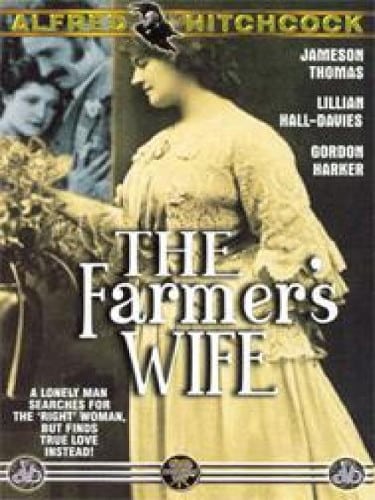
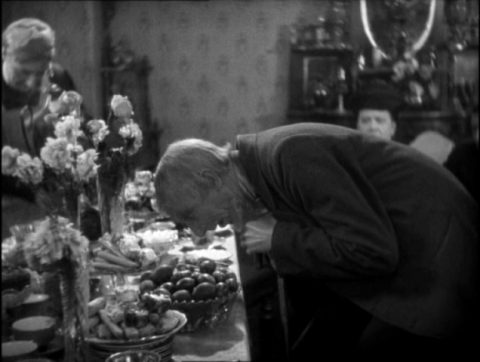
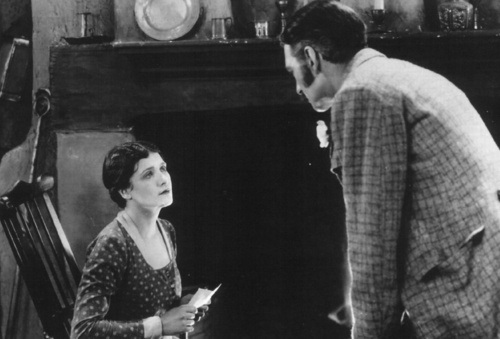

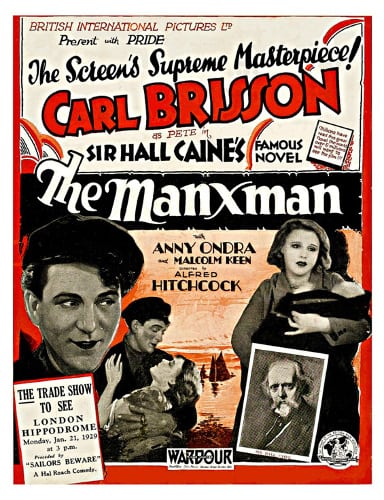
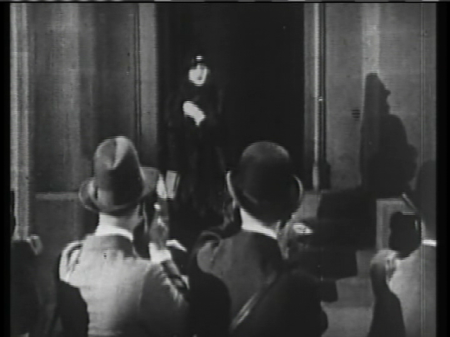
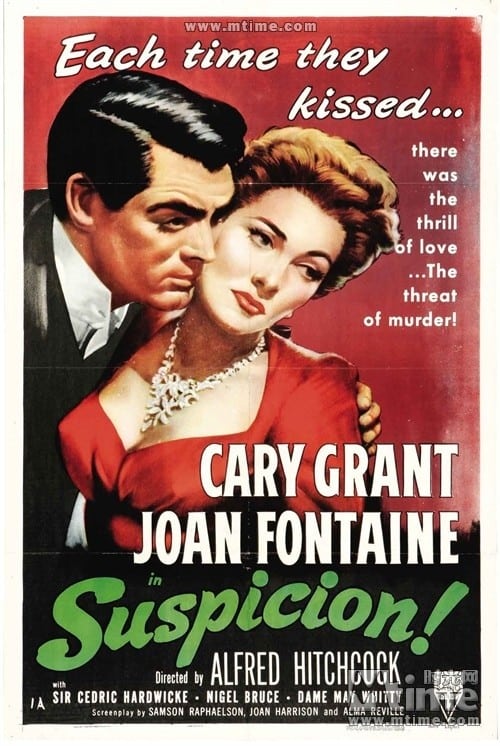
Be the first to comment